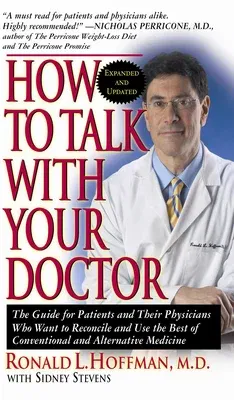More waiting rooms are filled these days with highly informed medical
consumers seeking to partner with their doctors. They want to explore
all promising treatments, both mainstream and alternative. To
physicians, these patients seem needy and demanding. They expect a lot
of attention, but are all too quick to question authority and battle
doctors for control of their medical treatment. To patients, though,
physicians can come off as stodgy, even arrogant. Many patients neglect
to mention the alternative treatments they are using for fear of
disapproval. Some walk away entirely from mainstream medicine. The
unfortunate pattern in each case is the same: miscommunication and
missed opportunities. Patients do not receive the best care available to
them, and doctor-patient relationships fall far short of the caring and
mutually satisfying exchanges they could be. How to Talk with Your
Doctor is a book for patients and doctors alike. It arms patients with
the tools and knowledge they need to communicate better with physicians
about using the best high-tech and alternative treatments. At the same
time, it helps doctors balance their skepticism of complementary and
alternative approaches with open-mindedness. Part One looks at how
doctors are trained, what practicing medicine is really like, and why so
many physicians still resist nonconventional approaches. It also
examines how growing interest in alternative treatments is changing the
practice of medicine and how it might change even further-for the
better. Part Two offers a blueprint for patients and doctors for
maintaining optimal health and dealing with chronic illness. It then
explores complementary and conventional options for preventing and
treating specific conditions. Separate resource sections for patients
and doctors list products, websites, and organizations that can help
promote better dialogue and medical collaboration so patients receive
the most effective therapies medicine

